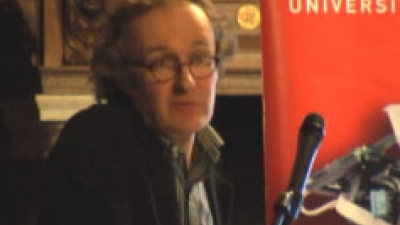Rights to a green future
Bovens started out, as we would expect of a Lockian thinker, saying that industrialized countries should be allowed more emission rights on the basis that they invested in a carbon-intensive economy. It's like Locke stating that those who work the land, can claim the land and it is just to do so. The interesting point which is nowadays forgotten by those who claim emission rights is that, Locke in his wisdom already defined the conditions under which this is just. This can only apply as long as nobody is harmed by the activities of others and as long as we leave the source intact, so it can regenerate. These insights bring us much further in the discussion on emission rights. It shows that these rights are conditional, since we have long passed the point at which someone can emiit without harm to someone else and we are even heading for irreversible climate change.
Devil's advocate
Bovens likes to play devil's advocate, stating that the developed countries are right in not wanting further one-side obligations to reduce climate change. According to Bovens, is too easily assuemd that Western countries should pay for the pollution they caused. Bovens calls this Versaille style war retalliation. The attitude of developing countries stops negotiations, because it fails to recognize the valid position of developed countries. From a Lockian perspective it can be said that developed countries invested time, money and other resources in the creation of wheatlth. Of course this is historically true, be it that a lot of whealth also was created at the cost of other nations and that the benefits of this whealth were not equaly distributed. This is why developed cuntries accepted responsibilities for global developement in the post-colonial period. Still it is a good thing the Bovens points out that we should be happy about developed institutions and the capacity for providing whealth. In the end his argument is rather pragmatic. We need developed countries as the motor also for a new cleaner economy.
Emission rights, clever or not
The whole discussion on climate change, being a threat to human life and the environment has been narrowed down over the last years. Most of what we talk about is emissions rights trading. As if this is a means in it's own right, rather than a means to an end. The idea of creating markets for emissions was succesful in that it managed to involve companies and the richer countries in the climate change debate. Other mechanisms proposed by the Kyoto-protocol have not nearly received as much attention or money. Clean technology transfer from rich to poor countries for instance led to some investment in China, but very little in Africa. Also the climate fund has received very little funding. Also Bovens concentrates on the trading schemes and the just devison of rights to emit. While starting from the developed country perspective and by following the Lockian analogy, Bovens succeeds in showing that rights is not the end of what we are interested in.
Lockian wisdom
Locke is well know for providing the Founding Fathers in the US with reasons why they could take land from the native americans, who didn't work the land. He failed, or the Fathers, perhaps misusing his arguments, failed to see that the native peoples had a completely different relationship to their surroundings, at least they didn't own land. In our present society of course people hold titles to property, whether we like it or not. We can even be clever and sell each other virtual goods such as broadcasting rights or carbon emission equivalents. However in the end we take these measures to solve a collective problem - how to make sure we don't overuse our resources. And this is something Locke already did recognize. Rights come with responisbilities for others and for the sources we all depend on.
Want to see the full lecture? Look at Responsibilities, by Luv Bovens.





